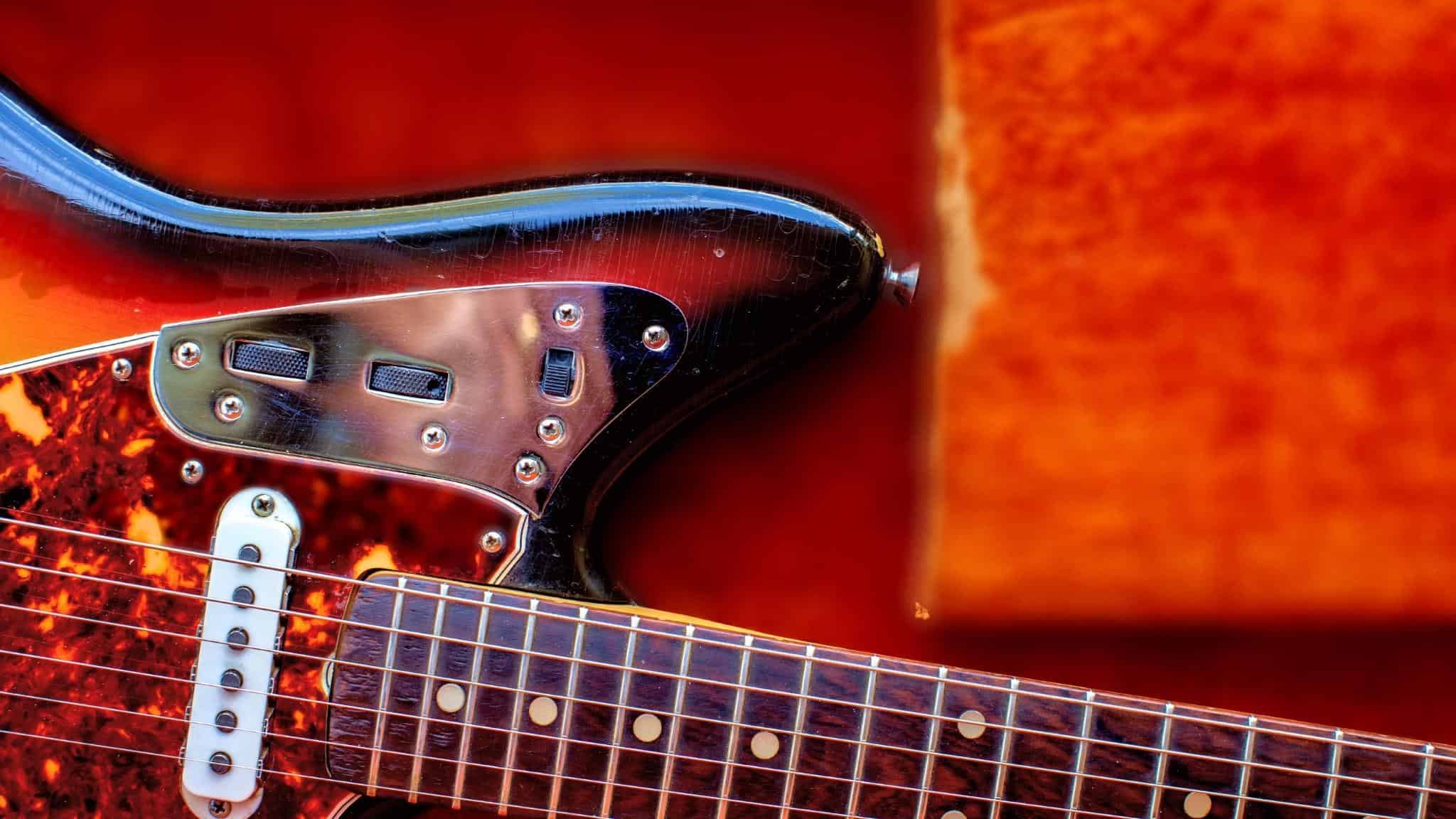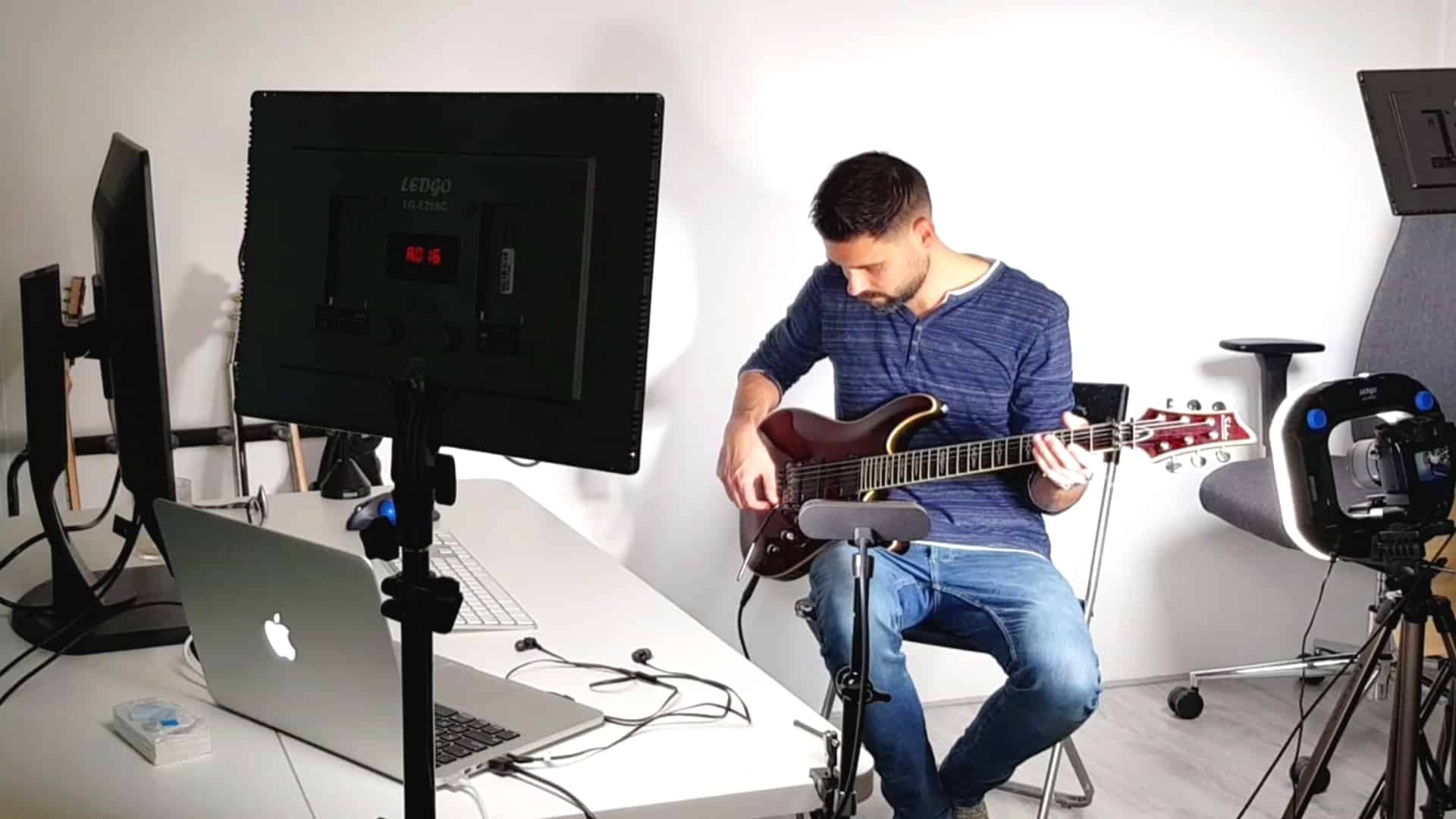A vintage guitar is an older guitar usually sought after and maintained by avid collectors or musicians. While any guitar of sufficient age can be considered a vintage instrument, the term is typically applied to guitars either known for their sound quality or rarity.

Why are vintage guitars so popular among collectors and musicians alike?
There are several reasons.
- First, vintage guitars simply sound better than newer models. The wood used to construct them is of better quality, and the craftsmanship is generally superior.
- Second, vintage guitars are often quite rare, making them valuable collector’s items.
- Finally, playing a vintage guitar can be a truly unique experience – one that every musician should try at least once!
You could almost say the instrument is alive with history and adds feeling to your playing.
Are vintage guitars a good investment?
Yes, vintage guitars can be a great investment. Because of their superior sound quality and rarity, they are often highly sought after by collectors and musicians alike.
Additionally, due to the popularity of vintage guitars, their value tends to increase over time. While there is no guarantee that any particular guitar will appreciate in value, investing in vintage instruments can be an enjoyable and profitable hobby.
So if you’re a collector or musician, don’t miss out on the chance to incorporate some vintage guitars into your collection or play them on stage!
Are vintage guitars better?
There is no definitive answer to this question, as opinions vary widely among collectors and musicians.
Some people argue that vintage guitars are simply better-made instruments with superior sound quality, while others claim that newer models can compete with their vintage counterparts in terms of both sound and playability.
Ultimately, whether you prefer vintage or modern guitars depends on your individual preferences and tastes.
Some say the best wood and material is no longer used to make modern-day instruments so vintage guitars really are of superior quality.
But then again, newer technologies were not available at the time of creating the instrument so that’s something to take into consideration as well.
That’s the reason musicians of more modern styles of music don’t usually use vintage guitars. Styles like metal for example with fast necks and Floyd rose tremelos that weren’t around then.
Are vintage guitars worth it?
As the value of a vintage guitar will depend on a number of factors. Some people might argue that vintage guitars are worth investing in because of their superior sound quality and rarity, making them valuable collector’s items.
Others might point out that since newer models can compete with vintage instruments in terms of both sound and playability, they can be just as good of an investment.
Whether or not a vintage guitar is worth investing in depends on your individual preferences and tastes.
So if you’re a collector or musician looking for a unique instrument to add to your collection or take on stage, don’t miss out on the chance to get one of these timeless instruments!
How do you determine if a guitar is vintage or not?
There is no single formula or method for determining whether a guitar is vintage or not, as different people may have different criteria for what qualifies as a “vintage” instrument.
Some common factors that are often used to assess the age of a guitar include its construction material, design style, and specific markings and labels.
Additionally, some people may also consider the guitar’s historical significance or value when determining whether it can be classified as vintage.
If you’re looking to buy a vintage guitar, be sure to do your research and consult with experts in order to ensure that you’re getting a genuine vintage instrument.
There are a number of fake or reproduction guitars on the market, so it’s important to be able to distinguish between a true vintage guitar and a counterfeit one.
When do guitars become vintage?
Some people may consider a guitar vintage if it was manufactured several decades ago, while others might only consider guitars that are at least 50 years old or older to be truly vintage.
Additionally, some people may also take into account the historical significance of a guitar, such as its role in popularizing a particular genre or style of music.
Which guitars appreciate in value?
This depends on a number of factors, including the instrument’s age, rarity, and condition. Some guitars that are considered to be vintage may appreciate in value over time due to their relatively limited production numbers or unique qualities.
Other guitars may also increase in value if they are associated with artists of significant historical importance.
The more it has a place in history, like a particular model that was popularized, or the actual instrument a musician has played, the more likely it is to increase in value over time.
Different types of vintage guitars
There are a variety of different types of vintage guitars available on the market, from well-known models like the Fender Stratocaster to more obscure or rare instruments.
Some vintage guitars may be more valuable than others due to their unique features, construction materials, or historical importance.
Some of the most popular types of vintage guitars include the following:
Fender Stratocaster: The Fender Stratocaster is a timeless classic that has been used by some of the most influential musicians in history. This guitar is known for its distinctive shape, bright sound, and playability. As one of the most popular electric guitars ever made, the Stratocaster has been used by musicians such as Jimi Hendrix and Eric Clapton.
Gibson Les Paul: The Gibson Les Paul is another popular vintage guitar, known for its combination of warm tone and sustain. This guitar has been used in a wide range of musical genres, from rock to jazz. Some of the most well-known Les Paul players include Slash and Jimmy Page.
Fender Telecaster: The Fender Telecaster is a classic electric guitar that was first introduced in the 1950s. This guitar is known for its signature twangy sound and simple design. The Telecaster has been used by a number of iconic musicians over the years, including Steve Cropper and Keith Richards.
Gretsch Chet Atkins: The Gretsch Chet Atkins is a unique guitar that was popularized by the legendary country guitarist of the same name. This guitar is known for its distinctive “hollow body” design, which gives it a unique sound. The Chet Atkins model has been used by a number of well-known guitarists, including John Lennon and George Harrison.
How to care for and maintain your vintage guitar
If you’re lucky enough to own a vintage guitar, it’s important to take proper care of it in order to preserve its value. Here are a few tips on how to care for your vintage guitar:
How to store vintage guitars
- Keep your vintage guitar in a cool, dry place where it is protected from dust and temperature fluctuations.
- Avoid exposing your guitar to direct sunlight or high heat, as these can cause damage to the instrument over time.
- Regularly inspect your vintage guitar for any signs of damage or wear, such as cracks, dents, or scratches. If you spot any issues, take your guitar to a reputable repair shop for professional care and maintenance.
How to clean vintage guitars
- To clean your vintage guitar, start by gently wiping it down with a soft cloth and mild cleaning solution. Avoid using harsh chemicals or abrasive cleaners, which can damage the finish or hardware of your instrument.
- Once you’ve wiped down the surface of your guitar, use a soft brush to remove any dirt or dust from hard-to-reach areas.
- If your vintage guitar has strings, be sure to clean them regularly with a quality string cleaner. This will help extend the life of your strings and keep them sounding their best.
If you take good care of your vintage guitar and give it regular maintenance and cleaning, it can continue to serve as a valuable musical instrument for many years to come.
The best places to find vintage guitars for sale
There are a few different places you can look for vintage guitars for sale, including online auctions, classified ads, and specialty stores.
- Online auctions: Online auction sites like eBay can be a great place to find vintage guitars for sale. Be sure to do your research before bidding on any instruments, as prices can vary widely depending on the age, condition, and rarity of the guitar.
- Classified ads: Classified ads in newspapers or online can also be a good source for finding vintage guitars. Again, be sure to inspect the instrument carefully before making a purchase to ensure that you’re getting a good deal.
- Specialty stores: If you’re lucky enough to live near a specialty guitar store, they may carry a selection of vintage instruments. These stores typically have a better understanding of the value of different guitars, so you can be sure you’re paying a fair price.
Somtimes, they’ll come in as trade ins in a regular guitar shop, for someone who wants to play something a little more modern.
Conclusion
If you’re interested in owning a vintage guitar, there are a few things you need to keep in mind.
Be sure to educate yourself on the different types of vintage guitars so you can find the right one for your needs.
I'm Joost Nusselder, the founder of Neaera and a content marketer, dad, and love trying out new equipment with guitar at the heart of my passion, and together with my team, I've been creating in-depth blog articles since 2020 to help loyal readers with recording and guitar tips.

